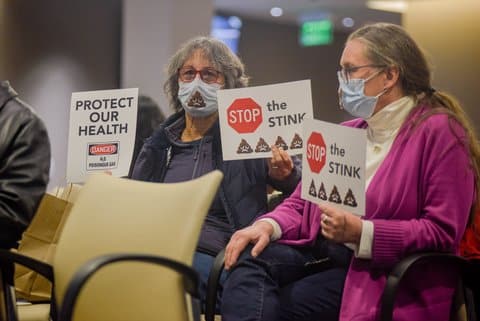
13 Dec Council Senses Something’s Off With Veolia’s Explanation of Foul Odors

Residents came to Tuesday’s special council meeting with a message for Veolia, the company that manages and operates the city’s wastewater treatment plant. (Denis Perez-Bravo / The CC Pulse)
By Samantha Kennedy
Richmond City Council made one thing clear to Veolia on Tuesday — sorry isn’t enough this time.
Richmond’s wastewater treatment facility released foul odors beginning Dec. 4 that prompted several complaints, a notice of violation and a special council meeting to get an explanation from Veolia Water North America, which manages and operates the facility.
But council members weren’t satisfied with the company’s explanation and — partly because of the company’s less than satisfactory history with the city — directed staff to investigate Veolia and impose consequences wherever its contract allows. One of those consequences could mean the eventual removal of Veolia as the facility operator.
Council member Cesar Zepeda “called for the special meeting to hold Veolia accountable,” he told The CC Pulse via text message.
“The council has an obligation to act,” said council member Doria Robinson, who proposed the motion, which passed unanimously. She said claims of fraud, failure to maintain infrastructure for residents, and the hundreds of reported incidents from the wastewater facility this year alone factored into her decision.
- Multiple people made a statement about the stench emanating from Richmond’s wastewater treatment plant — including Mayor Eduardo Martinez, left — by wearing masks that a local resident decorated with poop emojis. Council member Cesar Zepeda called Tuesday’s special meeting to demand answers from the plant operator.
In a Dec. 6 statement, Veolia said the facility had just finished a construction step part of a $42 million project to “rehabilitate portions of Richmond’s wastewater treatment plant” when odor sensors showed “above-typical levels” of hydrogen sulfide. Construction included replacing an outdated fan and draining a wastewater processing tank.
This construction, according to Veolia’s Director of Capital Program Management Chandrasekar Venkatraman, resulted in a temporary loss of voltage to fans in the facility that would otherwise circulate the odorous air.
Zepeda and council member Soheila Bana said they were hesitant to believe the loss of voltage, also known as a brownout, was responsible for the foul-smelling air.
Zepeda said that, in his communication with PG&E, the electric company was unaware of any brownouts that happened at the facility.
“I got the report from PG&E that day, and no brownouts happened,” Zepeda said. “So what else happened?”
He asked Veolia representatives to provide proof that a loss in power had occurred.
And Bana asked Veolia why a loss in power was not anticipated by anyone working on the project, which might have allowed the company to quickly remedy the situation.
Yet, even when the company was given time to notify city staff and community members, they failed to do so.
Melissa Sandvold, a regional vice president of operations at Veolia, said that the company has sent out emails or details of construction projects before but did not warn city staff of the higher potential for odors in this case.
When city staff began reaching out to Veolia in the early morning of Dec. 5 about the odors, they heard nothing until that evening.
Sandvold said Veolia regrets the burdens stemming from the “communication difficulties” and odors.
“Our team is committed to doing better,” Sandvold told the council.
City staff will be tasked with finding any breach of contract by Veolia and exploring other options should Veolia be replaced.
Veolia will present a report on the odors to the council in January.
The next regularly scheduled city council meeting is Dec. 19.


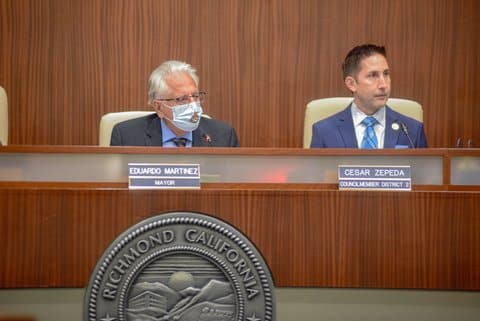
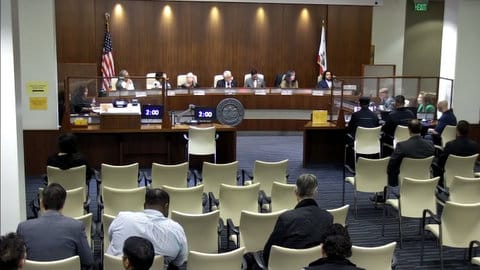
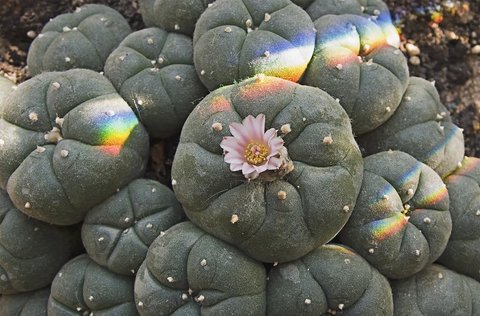
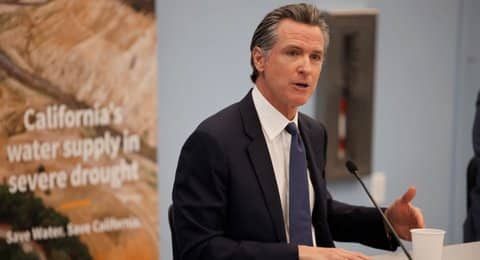
No Comments